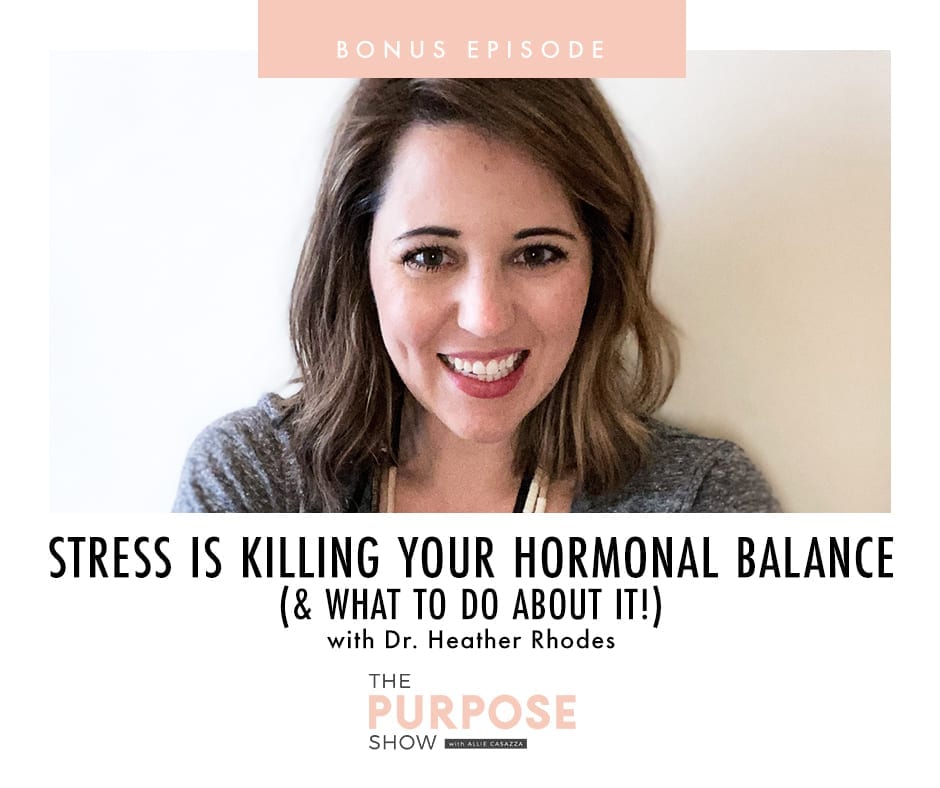

I’m bringing back a special guest today, Dr. Heather Rhodes! We recorded an episode a few months ago about hormone health and it was one of the most downloaded episodes that we have ever produced of The Purpose Show.
So, I brought her back for another episode! We’re talking about hormones again, but we’re really focusing on stress—what stress does to you, the effect it’s having on your hormones, and what do you do about it? Dr. Rhodes is a well of knowledge and this episode is so, so good! Let’s jump in!
In This Episode Allie and Heather Discuss:
The problem of stress and why it even matters
Things that raise cortisol levels
Supporting your body through the process of shifting cortisol levels
Daily de-stress rhythms
Why you should ditch your scale
Intuitive living
Mentioned in this Episode:
Courses (Use the code PURPOSESHOW for 10% off!)
The Purpose Show Facebook Community
Free gift for The Purpose Show listeners
Ep 130: Sunday Night Prep: The Key to Purposeful Weeks


My globally-praised online course, Your Uncluttered Home, will help you clear the clutter, reduce your stress, and create more space for what matters. This course has changed over 10,000 motherhoods. Yours can be next!


Mom life. We are surrounded with the message that it’s the tired life. The no-time-for-myself life. The hard life. And while it is hard and full of lots of servitude, the idea that motherhood means a joyless life is something I am passionate about putting a stop to. I’m on a mission to help you stop counting down the minutes till bedtime, at least most days. I want you to stop cleaning up after your kid’s childhood and start being present for it. Start enjoying it. I believe in John 10:10 “that we are called to abundant life” and I know mothers are not excluded from that promise. Join me in conversations about simplicity, minimalism and lots of other good stuff that leads to a life of less for the sake of enjoying more in your motherhood. I’m Allie Casazza and this is The Purpose Show.
Hello my friends! I’m so excited to be bringing back a guest today! Dr. Heather Rhodes is here with us again. We recorded an episode a few months ago about hormone health. Her expertise is women’s health—hormonal balance, hormone health—and she has been such a huge help for me in dealing with my polycystic ovary syndrome, my hormone imbalance.
She came on and recorded an episode with me. We actually recorded the episode live.
We went live in The Purpose Show community on Facebook, which if you’re not there, RUN! It is one of the happiest, most inspiring places on the internet.
That’s the community’s words, not mine. It’s just the place to be! We talk about the episodes and we take action on the episodes together. It’s a tribe and you’ve gotta be a part of it.
In that community we went live and she was taking questions from the audience. It was so good! That is one of the most downloaded episodes that we have ever produced here on The Purpose Show.
She is a well of knowledge and you just don’t want to let her go. You want to keep asking her questions because you want to be healthy. And hormones are confusing. Being a woman is confusing! And she’s brilliant!
I brought her back for another episode today and we’re talking about hormones again, but we’re really focusing on stress—what stress does to you, the effect it’s having on your hormones. It’s this sneaky, secret thing that is screwing you up.
But what do you do about it? How do you even de-stress and what does that look like? How is stress secretly hiding in your week?
It’s something that we’re going to talk about, something that everyone thinks is so great to be doing, but it’s actually spiking your cortisol and hurting your hormonal health.
It could be causing painful periods. It could be causing breakouts. It could be causing mood swings. It could be causing you to lose sleep.
It could be causing your body to really not be doing as well as you want it to be doing. And we’re going to talk about all of that.
What I want you to do is take a screenshot of this episode, share it on social media, tag me, tag Dr. Heather Rhodes. Share this message with all your friends, and then go join the Purpose Show community on Facebook. Start sharing about how you are going to take action on this episode. It is so good!
Go request to join the Facebook group now! Maybe by the time you’re done listening or by the end of the day, you’ll get accepted into the group and we can help you take action because that’s the main thing about this show.
I don’t want to just inspire you and walk away. I want you to actually do the dang thing that we’re talking about here, and today that is taking care of your hormonal health.
Let’s welcome Dr. Heather Rhodes again and please enjoy this conversation!
ALLIE: Okay, friends, I am sitting here again with my friend, Dr. Heather Rhodes.
Hi Heather! Thank you for talking with us again!
DR. RHODES: Of course! Absolutely.
I love talking about it, number one. But I really love just the interaction I’ve had with your audience and your women. I’m so happy to be back and continuing to serve them because they’re amazing.
ALLIE: Yeah. They’re really special. We have a unicorn tribe.
Everyone is generally very kind and ready to learn. They’re very coachable. They want to learn. And I think that’s really special.
DR. RHODES: Yeah, I do too. I think it’s amazing. What I love the most with what I’ve seen with your tribe, and the women that I know who have connected with both of us, is that they’re action-taking.
But also it’s just really small tweaks to things they’re already doing. And that feels so rewarding because they are experiencing this total shift in their days and in how they’re showing up in their motherhood and it’s just from these really small things. I love that.
ALLIE: Yeah, totally. It’s nice to be able to come in as the expert and be like, “Well you already have all the traits of this woman that you want to become. You’ve just got to change these little things.”
The last time we had a conversation we talked about hormone health in general. We talked about PCOS, acne, cycles, and all of those things. But today, I want to follow up with you and focus on stress.
You and I Vox back and forth a lot. We’ve been talking about stress and what it actually is.
So, what is the problem with stress? Really get into the research of, “Why does this even matter?” And then move into what to do about it.
DR. RHODES: Yeah, I think that’s awesome. To start, why does stress matter? Why does it affect us and why does it affect us so much as women?
I think this is really, really important. I think that stress levels are really overlooked.
Traditionally, your doctor’s not going to ask you, “Well, do you feel like you’re super stressed out? Here are some things you can do about it…”
Typically what happens is we just push through stress. We don’t have good strategies in place to manage our stress, and we’re basically flying by the seat of our pants day-to-day.
We’re also doing things that we may not even know are perceived as stress by our bodies. Our minds don’t perceive them as stress and we start creating this cycle where our body is functioning on really, really high levels of cortisol.
Cortisol is your main stress hormone. The issue is that cortisol is also the hormone that keeps your heart beating. So, when your body thinks it needs to have high levels of this hormone, then it really starts to shut down anything that threatens those levels staying high.
If it’s constantly being told, “Resources are low and there’s a really stressful situation around; we need to keep your heart beating no matter what.”
Then your body says, “Okay, this is top priority. Let’s shut down everything else.”
The main thing that gets shut down first, in women specifically, is our reproductive system, which is really smart because our body’s saying, “Oh, if there’s danger, low resources, and things are super stressful, then we’re not in a great environment to create this other life, sustain it, and have that increased demand for energy.”
But what happens is we may not even be monitoring those effects of fertility and stuff, but we’re still seeing a decline in those hormones.
Progesterone is like our unicorn hormone. It’s responsible for lowering cortisol levels and keeping us relaxed.
It’s responsible for giving us glowy skin. It’s responsible for that calming, female, nurturing energy that we have. But because its job is to lower those cortisol levels, if your body feels that it needs to keep those stress levels high, it shuts that baby down.
Low progesterone is something I see all the time. If someone said, “What’s the number one root cause of hormone imbalance that you see?” I would say, “It’s low progesterone.” And the reason for that is because we exist in a society where it’s so common for us to keep our stress levels high and not even realize we’re doing it.
ALLIE: How do you raise your progesterone?
DR. RHODES: Boosting progesterone is really going to be supporting your hormones and actually lowering your cortisol. There’s certainly some diet and supplement parts of that whole realm to get progesterone boosted.
But I truly believe that you could have your diet on point and you could be totally on point with supplements, but if you are consistently sending your body that signal that resources are low and energy demand is super high and very stressful, it’s going to lower and you’re not going to be able to get past that hump and get those normal progesterone levels really functioning.
ALLIE: What is it in modern life that you see women are doing that is raising cortisol, and people don’t realize that’s what it’s doing?
DR. RHODES: There are a couple aspects of this. If we look from a dietary standpoint, it’s under eating. It’s not eating enough fat. It’s skipping meals.
It’s feeding our kids all day and then scrambling to grab something for ourselves at 2:00 PM. It’s really ignoring our emotional needs at the same time.
A lot of times, when we deal with stress, we think we need physical or time boundaries, so we’re like, “Oh, I’m really stressed out. I need to go spend an hour by myself.”
That’s great. It allows you to decompress. But what you actually need is to have rhythms in place where you are working on that self-care from an emotional standpoint.
So, really look and ask yourself, “What are the things that are causing stress right now?” Is it overarching stress, like monetary/marriage/relational stress? Or are there daily stressors that I’m continually facing that I’m not addressing?
Is it decision-making? Is it feeling overwhelmed with making decisions and having decision fatigue?
Is it having a bunch of to-do’s in your brain that you’ve never organized and gotten on paper for your brain to see it, compartmentalize it, and really plan how to do what’s next? Are you setting expectations for your day that are really unrealistic and causing high stress?
That’s the emotional and the mental side of things women are doing that I don’t even think we recognize. It’s so common for us to just “Go” and not even feel stressed out and our bodies to be operating on fumes and only cortisol.
We see this when you see hormonal symptoms. If you’re having trouble sleeping. If you’ve gotten that rapid weight gain around your midsection and nothing will get rid of it.
If you’re having acne. If you’re having cravings. If you’re completely exhausted. If you have no libido. If the fatigue and the energy is crashing every day at the same time.
That tells us that your cortisol levels are probably way too high normally. But also that they are rising and falling rapidly because your body is trying to adapt but it can’t because it thinks that resources are still low and there’s such a threat to your heart continuing to beat.
There are also symptoms of PMS. Low progesterone is usually what’s responsible for that really crazy PMS feeling.
What happens is when our progesterone gets low, it allows our estrogen to essentially be overactive. So you see symptoms of high estrogen showing up more and more. And that’s those crazy mood swings right before a period where you feel like, “I’m going to bite someone’s head off if they say the wrong thing to me.”
ALLIE: So, this explains why, as I’ve been working for hormonal balance, I really don’t feel that PMS anymore. The only way I can tell that my cycle is coming is that it’s perfectly on time now every single month.
And I get a little bit crampy, just that kind of dull cramp like something’s happening. But I no longer am up and down for three days before.
I was wondering if that was diet so that makes sense to me. That’s such good news after going through that cycle since I was 14 years old.
DR. RHODES: I feel like it’s been night and day watching your transformation from when we first talked and what your period felt like. Something you mentioned to me that just sat with me, because I think so many women struggle with this, is your feeling like, “I know something’s off with my hormones, something’s off with my health. I’ve always been taught and it’s been ingrained in my mind that I need to look at diet and exercise.”
But we totally forget that is one piece to the puzzle. Your mental state, your stress, doing things to lower cortisol—breathing, mindfulness, showing up for yourself in that way, in that actual self-care—is so much more of a piece that’s going to make a greater impact.
I’m always trying to show women that hormones can be simple and you want to do the things that are gonna get you the most bang for your buck. And if you’re pulling hairs in a diet, that’s not going to get you the most bang for your buck.
You’re better off spending your time not being super, super crazy about your diet, but supporting your body, eating enough calories and all of that, and really focusing that extra time on doing things that are going to help lower your cortisol levels.
ALLIE: For me and what it looks like in my life, and for all the women listening, I think it’s about that overarching goodness of life that fuels happy feelings and calls positive emotions out of you. This is why in our last episode we mentioned clutter.
If you have crap everywhere and you hate your home it’s going to spike your cortisol. It’s a scientific fact. They’ve proven that multiple times.
It’s the same thing with my business. I’m so driven and I’m such a pusher, but I have stopped having to do everything that I think of right away.
Now I’m like, “What’s the calendar look like? These are my time boundaries.” And if something, a project, isn’t going to fit in there, then it has to wait rather than pulling an all nighter. I’m excited and I love my job but I would push myself too much.
You guys, as listeners, need to be thinking overall where are there pockets of stress in my home, in my relationships, in my work that I can quiet down? What do I have control over? Then also diet, mindset, and taking care of your body.
You’re stressed? Well, go to the gym. Can you talk about that? Can you talk about working out? You’re saying raising your cortisol, your heartbeat, and all these things but that’s what exercise does.
DR. RHODES: It’s really interesting because we know there’s a lot of benefits to exercise. Exercise is really great in helping us stabilize our blood sugar. It’s great for our heart to have that activity. It helps with long-term disease and all of those things. Exercise has benefits.
If you are existing in a state of high cortisol—you’re skipping meals, you’re not sleeping, you’ve got four kids, everything feels like a mess—and you think an hour at the gym is your escape…The reason we feel like that is because we get endorphins, which are positive, happy hormones after we work out.
But all we’ve done is further that cortisol increase. So, when those happy hormones wear off, we’ve actually further worsened what the true root problem is, which is those high cortisol levels.
A lot of times I see that we go to the gym and we use activity as our stress reliever, but we’re not doing it in a way that’s going to actually lower stress. When you’re thinking about using exercise to lower stress, most people think, “I’m not really pushing myself.”
I can remember back when I felt super stressed, I felt like that meant I needed to take that cortisol and that stressful energy and make sure that I was hitting the yards, running faster, and really getting it out in that way, which feels great momentarily. But if we look long-term it actually is increasing your cortisol levels even further.
What I really should have been doing is spending an hour doing yoga, doing deep breathing, and any type of exercise that focuses on a breathing technique. It can still be mild to moderate intensity.
Yoga is freaking hard. I’m standing in one position for 30 seconds, shaking and sweating and at the same time I’m focusing on my breathing. All of that together is actually going to help lower cortisol more than if I was doing a hundred pound snatches all day.
ALLIE: Yeah, totally. What you are saying is so counter-cultural. You have helped me so much with diet because the question for me has always been, “Okay, I understand this but what do I eat?”
You’ve given me so many resources for that and we’ll link to all of those things from you in the show notes, too, for other people. But with exercise, I’m doing Pilates.
You know I love Robin Long and her membership. I use it everyday now because as we record this we’re in quarantine, but even without that I normally use it a couple of times a week and it’s so good.
But sometimes it feels like, “Am I going to lose fat? Am I going to lose weight? Is this doing anything?”
But it is. We talked about this in the last episode about when I had a trainer and I was kicking my butt four days a week, I didn’t lose an inch for six months.
I felt terrible. I started having cysts that I could feel on my ovaries. One of them ruptured and I had to go to the hospital.
This was all from eating 1400 calories a day, which is ridiculous, but that’s what I was told to do. I was doing CrossFit and functional training that was spiking my cortisol. It’s all exactly what you’re saying.
I think that women are unhappy with their bodies and so they want to push themselves to a smaller size and into feeling better. Which there’s no crime in wanting to feel better and there’s no crime even in wanting to lose weight, but how are you getting there?
What if you relaxed, you breathed, you did yoga, you ate good fats, fueled your body and you didn’t let yourself feel hungry all the time? You’d feel better. I am getting healthier for sure.
DR. RHODES: Exactly.
I see this come up a lot with my clients, and I can relate so closely to it because I know where they’re at and why they feel this way, and it’s that desire for a quick fix. We want to think, “Okay, everything you’re saying makes sense. I’m going to support my hormones. I’m going to support my body. I know that’s the root cause. I know that cortisol is why the weight is here. I’ve tried everything but after about three weeks, either the weight is increasing or it’s not decreasing. Oh my gosh, this isn’t pushing me in the direction I need to go.”
And so, I have to remind people all the time that when we’re addressing hormones and when you are working to lower cortisol in hopes that the end result is to get that extra cortisol-driven weight off, that takes a lot of time.
It takes a lot longer than if we were going to force your body to lower weight because it feels there’s a threat, which is what happens with low-calorie diets and high intensity workouts, especially when we combine those. There’s a reason those things work for weight loss. Weight loss science is very black and white when it comes to those types of things.
But if we’re looking at hormones, your body, how you feel, and what other symptoms are going to pop up, it’s a long game. We’re out here to say, “Support your body and trust it because it may take three to four months.”
You’re literally trying to change patterns that your body has existed in for years. And if it takes a while, that’s okay. It’s just a mental game of how do you push through those 4/6/8 months that it may take for your body to rebalance itself.
And sometimes it overshoots itself. So, if you’re trying the things that I’ve shared before or the things that you really genuinely feel and know your body needs to get extra support, and you see the scale increasing, I tell people, #1, to just throw out the scale because it’s just crap. Then I say, #2, that it is okay.
Your body needs to do this to make sure that it’s safe, to make sure that resources aren’t going to get low again. It’s doing this to protect you.
It knows that you’ve dieted before. When you start giving it what it needs, it says, “Oh my gosh. I need to hold on to all of this and keep it because I don’t know how long this is going to last for.”
And then when you get consistent and it realizes, “Okay, this is a pattern, this is normal. We’re going to exist like this from now on.” Then it starts to let go and it’s not so tight-gripped.
Then the weight slowly comes off and you start seeing the muscle changes. It’s almost like you immediately feel those benefits of supporting your body because your fatigue is gone, your mood is better, and your acne starts clearing up.
But the weight is still there, so we think that we’re doing something wrong. And that’s not the case. It’s just that it’s a long game.
When you get to the other side of that there’s so much freedom there because then you can have a weekend where you go out of town, you eat out, and your body doesn’t flip out over it. It literally knows, “Oh, we’re getting a little extra right now and that’s okay. We can process that. We can detox that. We can go back to normal and things will be fine.
Whereas if you’re in that state of restriction and fighting your body over and over with diet after diet after diet, working out and increasing those cortisol levels, you go on vacation, you relax and you eat, and you feel like you’re 20 pounds heavier when you come home.
It’s because your body’s like, “Oh my gosh, you gave me something. Let me hold on to all of it.” So, you actually are experiencing this long-term freedom that I think is so worth those 4/6/8 months or however long it takes for your body to feel that support and start reacting to it completely.
ALLIE: Okay, so in what you just said, that it might take some time for your body to adapt, are there things that we can do to—I don’t want to say, “speed up,” because I don’t think the intention is to be like, “Hurry up, I want to lose weight”—but are there things we can do to support our bodies and get to that place where the cortisol is lowered and our bodies have realized we’re safe and there’s plenty of resources?
I know that you mentioned in the last episode the “legs up the wall practice” and you lower your cortisol literally while you lay there. Do you think that things like that and drinking a lot of water will help get you to that place?
When I speak affirmations over myself for anxiety, things like, “I am safe. I am held. I am supported. I am deeply loved and supported by the Almighty Creator. I am here. I am good. I am safe.” I feel the stress going down. Doing things like that and meditating every day, does that speed up that process or does it just feel good in the moment?
DR. RHODES: So, this is another part. What are your body’s core functions? What are the core design functions of your body as a female?
To keep your heart beating (which it uses stress hormones to do that), to reproduce (which it uses our female hormones to do that), and then to find what we call homeostasis, which is normalcy. Your body is always taking everything you do and trying to create a pattern out of it because it wants you to be as comfortable as possible. And if it can’t predict your pattern, it feels really uncomfortable.
We chatted about this before a little bit and how if you don’t eat every day until 11 you might be really hungry the first couple of days that happens, but then you adapt and then you’re not hungry till 11, right? That is your body reading that input and adapting to it. It does the same thing when we give it those constant signals to lower cortisol levels.
I talk a lot about teaching women how you can do rhythms and essentially create stress-lowering activity as a part of your routine, so that way on the days where you are super stressed and you don’t have time to do those activities, your body already knows, “Oh we normally drop cortisol around this time. She puts her legs up the wall every day at 1:00 PM and today she didn’t.” But it’s already ready to follow that pattern before you even do it if you’re consistent.
I teach women if you can find these 5-7 minute pockets to do these stress strategies, then it’s actually setting you up to experience the benefit of lower cortisol even when things are really, really stressful. I think a lot of times it’s really common for us to wait until we feel that total overwhelm, total stress.
I can’t do it. I need to go book a hotel room for the weekend and sit by myself. We get to that point, and we’ve let ourselves get to that point.
I’m coming against that and saying, “Yes, that’s a great strategy. You should take time when you need it to really restore yourself, but it’s gotta be a daily practice. Because if you’re at that point, then your body has already shifted so much.”
You’re looking at 60-90 days for it to try and repattern itself. If you can be really consistent, then that’s going to speed up the process, especially being really consistent with changes you make.
How do we speed the process up and how do we really support our bodies through the process of shifting cortisol levels? Looking at the diet side of things, a big thing that happens is we do it really well, we know it’s right, and then we want to switch. So, we start counting macros again or we start lowering calories again. But every time we do that, it actually makes the process take longer.
So, I tell people, every time thoughts come in your mind of, “Maybe I need to do X, Y, Z diet because it’s going to get me the results faster,” or, “I’ve gained five extra pounds and I can’t do it; I need to go back to counting macros,” or whatever it may be, I tell people to really push through those thoughts and say, “No, what is the end result here? What happens if I do that? I’ve done that before. It didn’t work.” And really saying, “My body’s worth me really exploring my motivation to lose weight. My body is worth me really exploring why I feel like I do at this space right now.”
It’s a combination of a lot of things, but I think we’re told it’s normal to feel the way we feel. I think we’re told it’s normal to feel super stressed out, to have anxiety, fatigue, or exhaustion.
We’re told that our PMS is normal. I think it really is that introspective look at what is my motivation for the changes I’m making?
What are the symptoms I’m really wanting to overcome and address? If I have to weigh 5-10 pounds more to enjoy my motherhood, be awake, not be nagging, to take my kids on adventures, and to fix my migraines—girl, have the 5-10 pounds. Buy the next size up in shorts and let’s move on with life.
I think it’s so empowering when you realize your body’s going to exist how it needs to and if you’re supporting it to health then it will be healthy.
ALLIE: And if you are truly at a weight that is not healthy for you, your body will lose that; it just might take time. That is what everyone needs to hear and what I’ve needed from you because it’s frustrating.
It’s frustrating to be doing all of this, moving so counter-culture, choosing that peace and calm instead of hitting it at the gym, and yet not see those things shifting yet.
But I feel better. I’m less stressed. I’m a happier person.
I feel like my bloating is all gone. My tummy is soft and flat. I feel good. It was hard and bloated. I was gaining fat there and normally I’m a thighs and butt girl, but it was hanging in my midsection because of all the stress I put myself through in that stupid training situation that I did last year.
You mentioned having rhythms which you know I love that so much; that’s everything that I’m about. But can you mention some examples of a few minute-pockets throughout the day rather than waiting until you’re freaking out and you need to go away for a weekend?
That happens and then most of us can’t do that, so you’re just back in the cycle of stress, wanting something you can’t go and get.
What are some de-stress rhythms in a day? Could you give some examples of that?
DR. RHODES: Yeah, for sure. Definitely how you start your morning is really, really important.
Cortisol levels are highest in the morning when you wake up. Typically, we wake up and we do one of two things.
We either reach for our phones and start going through them because the blue light helps us wake up. And the reason it does that is because it increases cortisol levels from feeling like we have interactions with people. Or, we start thinking about our to-do list and our brain starts cycling.
What I say to do instead is wake up, do some stretching with some deep breathing. Deep breathing is really easy to just pull in 5-7 minute segments throughout your day.
Deep breathing is what we call parasympathetic breathing. It’s breathing that’s been shown in studies to shut down the sympathetic or fight/flight nervous system.
It’s breathing in for a 4-count, then holding it for an 8-count at the top, and then releasing really slowly for an 8-count. That’s a really technical way to do it, but if that feels really heavy or hard to do, then literally just focus on deep breathing.
Breathe in deeply, taking longer to breathe out, filling your lungs, seeing how that feels. Do a body check-in in the morning.
Then you can do a brain dump. Brain dumps are basically whatever is sitting on your mind at that time, you just put it on paper.
It can look like absolutely anything. It doesn’t have to be actual sentences. It doesn’t have to be a to-do list.
I have examples of mine and they’re like, “Check on Judah’s clothing size. Talk to Ben about this. Do this at work. Send this email. What to do about finances.” It’s literally anything my brain is thinking or that has been looping in my brain.
When my brain can see it visually on paper, it’s able to process through it and I don’t necessarily get stuck. This is kind of going a little bit more into brain psychology I guess, but when we have trauma, stress, or something that our brain doesn’t necessarily know where to put, how to put it or store it, then we start cycling it. And that actually makes us on edge the entire day.
Let’s say you have a really stressful situation. Something happened in a friendship and it just feels like it’s impacting everything. You can’t stop thinking about it, you don’t know if you did the right thing.
I tell people to either write it down, Vox themselves, or send themselves a voice memo so that they can go listen to it again. What we normally want to do is go talk to all our other friends about it, right?
And there’s a reason that feels good for us. It’s because we feel like someone’s coming in and helping us process. But actually we can do that on our own by getting it out, allowing ourselves to hear it back, and to process it within ourselves.
That’s the benefit of doing that mental check-in, that brain dump, and helping your brain to really look and identify your sources of stress. Basically you address them, organize them, and come up with a strategy.
Another example of that would be like if you know that every day in the morning you just feel super stressed about what you’re going to feed your kids. Or there’s a lot of decisions you have to make like who’s going to do what, who’s school starts when, and all of that. Automate the decisions you can.
If you know every day you have to pick out your kids’ clothes, then do that one time a week. Have all of the clothes picked out so then every day you’re not being faced with the same decision that’s creating decision fatigue over and over and over again.
ALLIE: Yes! This could also be a part of their Sunday night prep. If you guys haven’t listened to the Sunday Night Prep Episode, you should because this is basically what Brian and I do together every Sunday night. It’s like looking ahead and being proactive so that there is less stress, less bickering, less miscommunication and raised cortisol throughout the week.
What I hear a lot when I talk about this is women will say, “Well, I wake up in the morning and I can’t have that morning ritual time because I have a baby and I have to go make a bottle.”
Well then, go make a bottle, but that’s such a temporary time of your life in terms of raising your kids. As soon as they’re toddlers, you can teach them, “You need to wait a minute. We’re going to set a timer for five minutes and when it’s over mommy’s going to go downstairs and get you cereal or whatever.”
And in that time, you’re doing your stretching, you’re waking up the right way, you’re taking care of yourself. I think that any excuses that might be popping up right now, gut check that and ask, “Is this legitimate? Is this temporary? Do I have more ownership over this than I’m giving myself credit for?”
DR. RHODES: And bring your kids into it. If your toddler’s up and wants to eat again, teach them to sit and breathe.
I know that’s hard; I have a 2-year-old. But at the same time there are ways that you can utilize this.
That’s a whole other side of this is letting our kids see that it’s normal to check in with ourselves, to check in with our emotions. Letting our kids see what we do to lower stress. It’s only going to help them.
I went through middle school, high school, college and never even knew what stress relieving was. Every now and then I would go get a massage if someone else paid for it.
It’s something that’s not necessarily talked about. We think that, “Oh, you get to the point where you are about to break down, then you get counseling and they teach you ways to manage your stress. But that’s not a great set up for how we should be living.
I think we should teach our children how to do these things and manage their stress throughout their day. Talk to them about what stress feels like, identify their emotions when they experience them, and you can say, “Oh, that’s stress.”
Then, basically, find those pockets. If you are done with homeschooling and you’re about to have lunch with the kids, do some legs-up-the-wall, a couple minutes of deep breathing, some restorative poses.
I have lists of those: Downward Dog, Child’s Pose. You can Google these. They are meant to be restorative, so they are meant to lower cortisol levels.
You can say, “Okay guys, we’re gonna eat lunch in three minutes, but I’m going to set a timer on my phone and we’re just going to sit here and do some breathing in Child’s Pose.” Show your kids how to do Child’s Pose.
They did a study that was really interesting. They were looking at cortisol levels and following them throughout the day, seeing what actually lowered them, and watching a humorous video lowered cortisol levels. So, laughter lowers cortisol.
Find a way. If you know that every time your kid does karaoke to The Troll soundtrack you laugh, then have them do that throughout the day with you. Those are creating really vivid memories for your children and encouraging that in your home, but then at the same time it’s actually lowering your stress levels.
ALLIE: I love that. There’s this video that’s been in my phone notes for years. The phone note is called, “For A Bad Day,” and there’s a link to this YouTube video from The Office of all the times that Michael has hated Toby, or said something where he hates Toby.
And for some reason it makes me laugh so much. It’s like a reel of all the seasons where he says something about Toby and it makes me belly laugh. It’s so good to hear you say that. I’m going to pull that video out more often.
I want to ask one more question really quick about the scale. You mentioned earlier that the scale is crap and we just shouldn’t even really abide by it.
And you’ve told me that so many times and I finally got rid of my scale. I wouldn’t even check it very often, but I would do really well for X amount of weeks and then be like, “I wonder..” and I’d check.
Then I’d be deflated. Saying it right now, I want to throw up because that is so far from where I’m at now. I just can’t believe I ever did that to myself.
And then everything you’re saying about it taking a few months for your body to acclimate, it all just makes so much sense. I want women to understand why you say that the scale is crap? Why do you think that every woman should just ditch their scale?
DR. RHODES: I think that it’s been ingrained in our minds that, “Oh, we need this number of weight to determine if we’re healthy or not.” And I just believe there’s so many other markers of health.
Your scale has basically become this way to either validate or solidify what we feel like we’re doing, or to make us feel really shameful, full of guilt, and like we need to be doing more.
When there’s that much emotion tied to something, it’s not actually a true marker of your health. It’s a marker of essentially how well you’ve adapted to society’s standards that they’ve placed on you.
I think that it is possible for some women to have a scale and it literally not affect them. But for the majority of women we are basically using it as a marker of how well we are doing at either losing weight, dieting, or eating the way we should be or whatever.
Your body gives you so many other signs and symptoms of your health that I really think you can focus on those. And the more you support them, the more your body is going to be healthier, feel better, and fall back into alignment.
So, if you’re thinking, “Oh, I need to check the scale because my doctor says I need to lose this much weight to be healthy or to lower my blood pressure or whatever,” then let’s look at your blood pressure and say, “Okay, well your blood pressure’s high. I’m giving you a specific diet and exercise to lower your blood pressure.”
Do that, and then let the doctor tell you how your blood pressure looks the next time and let that be something that determines whether or not you’re going to move forward with what you were doing or change it.
Look at your period as a marker of health. Look at your skin as a marker of health. Look at your energy levels.
There are so many other things that our body tells us every single day of how we are doing with our health goals and how well we’re supporting it. I really feel that science has told us how we should feel about what that number is and it’s just sad.
I think there’s plenty of people that are really healthy, have great blood work, great cholesterol levels, great blood pressure, and according to the scale would be deemed obese. So there’s loads of studies out there that say if you have obesity, this, this, this, this, and this could happen to you.
Well, yeah, they could. But they could also happen to you if you don’t have obesity.
Are your chances higher? Yeah, possibly. But there’s only so much you can do to serve and support your body. And if you’re doing that to the max capacity that you have in this season, then don’t let a scale tell you that you need to be working harder because you can’t.
You know where you’re at, you know how you’re feeling, you know what you’re doing to support your body and you know how to do it. Just keep pushing forward with that. Keep serving your body and keep supporting it.
And if you feel like, “Oh, I have some extra capacity, should I be using that to take an extra walk, get more strict with meal planning, or cut out some not-so-great foods?” Then yeah, do it.
If those things have popped in your mind, then they’re probably great actions to take. You don’t need a scale to tell you, “Oh yeah, you definitely should.”
ALLIE: It’s intuitive living. I’m just being super open here. I used to have a nightly thing that I would do where I would have a glass of wine while I made dinner. And then I realized, “Wait a minute, every single night I’m having a glass of wine.”
And most of the time it doesn’t even sound good, but I don’t like cooking so I would have a glass of wine, light a candle, play music, and make this ritual out of cooking because I don’t like to cook. It was just a habit.
And so, I stopped telling myself the story that I don’t like to cook. I also didn’t tell myself, “No wine.”
I just was like, “I’m going to stop telling myself this story about cooking and decide that I only cook a couple nights a week because I split it with my husband. It’s just something that I do and I’m gonna create a different way to enjoy that ritual and I’m going to have wine when I want wine.”
Now I have wine two nights a week, maybe sometimes a little bit more, sometimes not at all because a lot of the time what I want is a detox tea or a calming drink, or I have this organic soothing powder you can put in almond milk or whatever and it’s so good.
I feel like what I’m saying right now would have annoyed past Allie so much because it’s kind of like, “Yeah, right. You want the wine.”
But when you really check in having a glass of wine just doesn’t always sound good. So I think when you live what you’re saying and you follow your intuition, you realize, “Oh, this thing that I thought was such an indulgence or was such a part of my life, I actually don’t really even want it half the time.” We don’t stop and tune into ourselves.
For women, specifically, there’s this detachment from your inner self. Your inner being knows when you need to cut something or when you need to add something and if you just tune into that, things will pop into your brain.
It’s like this divine download and you think, “Oh, I wonder what would happen if I just stopped eating that? Maybe that’s why I’ve been having diarrhea every now and then, or having an unhealthy cycle or whatever it is.”
It’s so much less about researching, pushing, figuring it out, testing and trying intermittent fasting, and doing all these harsh things. What would happen if you just turned that off, unfollowed all those accounts on social media, and tuned in to yourself? It sounds so cheesy, but really that has made a huge difference for me.
DR. RHODES: Yes. Same here.
If I was listening to this podcast a couple of years ago, I would be like, “Man, she’s a quack. She doesn’t have the willpower and the grit to really stick out Macros and CrossFit and all of that.”
I can vividly remember when I was sure that Keto was my fix. I can remember when I was doing Keto and literally putting pepperoni and butter in a pan and then putting cheese on top of it and being like, “Oh yeah, this is it.”
But then thinking to myself, “How is this better for me than a salad, fruits, oatmeal, sweet potatoes or all the things I thought I couldn’t eat?” It does make such a difference when those things pop in our mind and we think like, “Oh well, the research says,” or “This girl looks like this and she does it.”
Another really important thing I want to mention just as a part of your rhythms, routines and stuff is get those people out of your social media feed! Obviously everything we see on our social media feed is how we perceive the world.
It’s very specific to us and what we’ve looked at before, so it is almost making us hyper-focused on this whole issue because we’re seeing it constantly. But that’s not really the real world. That’s just what our specific world looks like because there’s algorithms around all of social media.
If you have gone on Google and searched a diet or Keto or whatever, automatically in your Instagram and Facebook you are going to start seeing the coaches, the people that it’s worked for, the bikini bodies and all of that, so it is literally playing tricks on you.
I tell anyone that I work with one-on-one or that does my plans and courses, “Get that stuff out of your feed. You just don’t need it.
It’s not supporting you. It’s not serving you. It’s just presenting goals to you that aren’t your goals.
Your goal right now is not to look like her. Your goal is to assess your body, to feel better, and just support it. If something is making you second guess that, get it out.”
ALLIE: Absolutely. I love that so much.
You mentioned to me before we recorded that you created a page for everybody. Do you want to share what’s on that and how it’s gonna help them?
DR. RHODES: Yes! At Drheatherrhodes.com/allie I have a freebie of Basic Hormone Support: Your Three Best Steps To Tackle Your Hormones. It includes some stress-relieving activities.
Guys, use that web page, that website. There’s all different ways to connect with me, to look at the different resources I have.
I don’t want women to feel stuck. I don’t want women to feel like hormones are this big, crazy hard concept they can’t plug into.
I really think that it is these simple shifts and these simple fixes and really starting to pay attention and support your body and your hormones that literally will change your life.
ALLIE: So good. Drheatherrhodes.com/allie.
Thank you so much, Heather! You are just a well of knowledge and you’re so helpful.
I know everyone loved your last episode and this is just as good, if not better. This is so good. Thank you so much!
DR. RHODES: Thank you for having me, Allie. You’re the best!
ALLIE: Oh my gosh! Friends, didn’t I tell you this was such a good one!
I just wanted to come on here and record a quick note. In this episode I talked about the glass of wine at night and everything.
And after Heather and I were talking, she texted me a couple hours later and was like, “Hey, I forgot to tell you, I think that a lot of your listeners might have little things like that, especially like the glass of wine. If you ever feel like you want the ritual of having something like enjoying a glass of wine, it’s really about the ritual. It’s about enjoying the moment. It’s not really about the wine at all.”
She said that she puts Kombucha in a wine glass at the end of the day and it just does the same thing for her. It’s good for you though and it’s calm.
It’s calming her because it’s a ritual. It’s a ritual of pressing pause for a second, pouring yourself something that’s not water but feels like a treat, enjoying it during the evening as a ritual to winding down at the end of a very busy day.
I really, really liked that! You could also do this with sparkling water and some berries or ice. Whatever floats your boat.
I just thought that was brilliant. I’ve been doing that since we recorded the episode.
At this point, it’s been a few days since we recorded. I have been doing that the last three nights and it’s been great.
I feel great. I feel good. I’m enjoying it. And it is about the ritual of winding down at the end of the day, it’s not even about the wine.
I just wanted to come in, add that tip, and encourage you. If anyone else heard that part of the episode and they were like, “Yeah, I do that too.” This has been helping me.
And you know what? Sometimes I just want the frigging wine. And it’s fine.
But if it’s sometimes not that and it’s just about the ritual, you could replace the wine with something that is healthy and good for you and can still help you signify that you are winding down for the end of the day.
Don’t forget to go to Drheatherrhodes.com/allie for all the special links that she shared in this episode and go connect with Dr Heather Rhodes and let her help you improve your hormonal health.
Love you guys! Have an amazing rest of your day!
This was an episode of The Purpose Show. Did you know there is an exclusive community created solely for the purpose of continuing discussions surrounding The Purpose Show episodes? And to get you to actually take action and make positive changes on the things that you learn here? Go be a part of it. To join go to facebook.com/groups/purposefulmamas.
Thank you so much for tuning in. If you are ready to uplevel and really take action on the things I talk about on my show, and get step-by-step help from me, head to alliecasazza.com. There are free downloads, courses, classes, and ways to learn more about what the next step might look like for you and to focus on whatever you might need help with in whatever season you are in right now.
I am always rooting for you, friend! See ya next time!
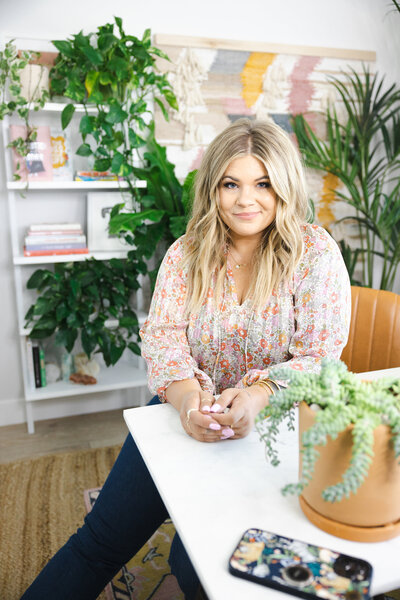
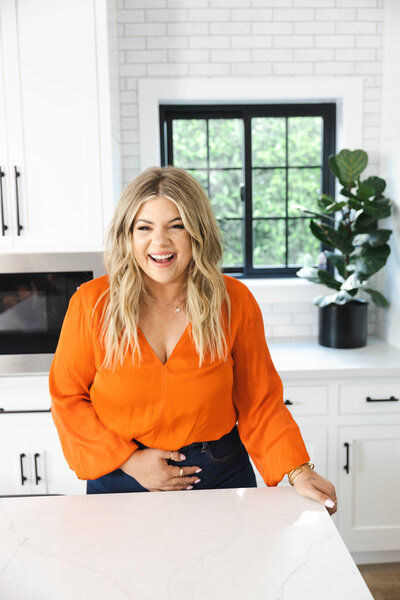
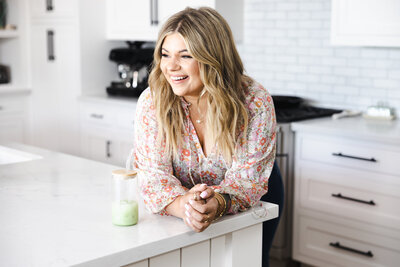
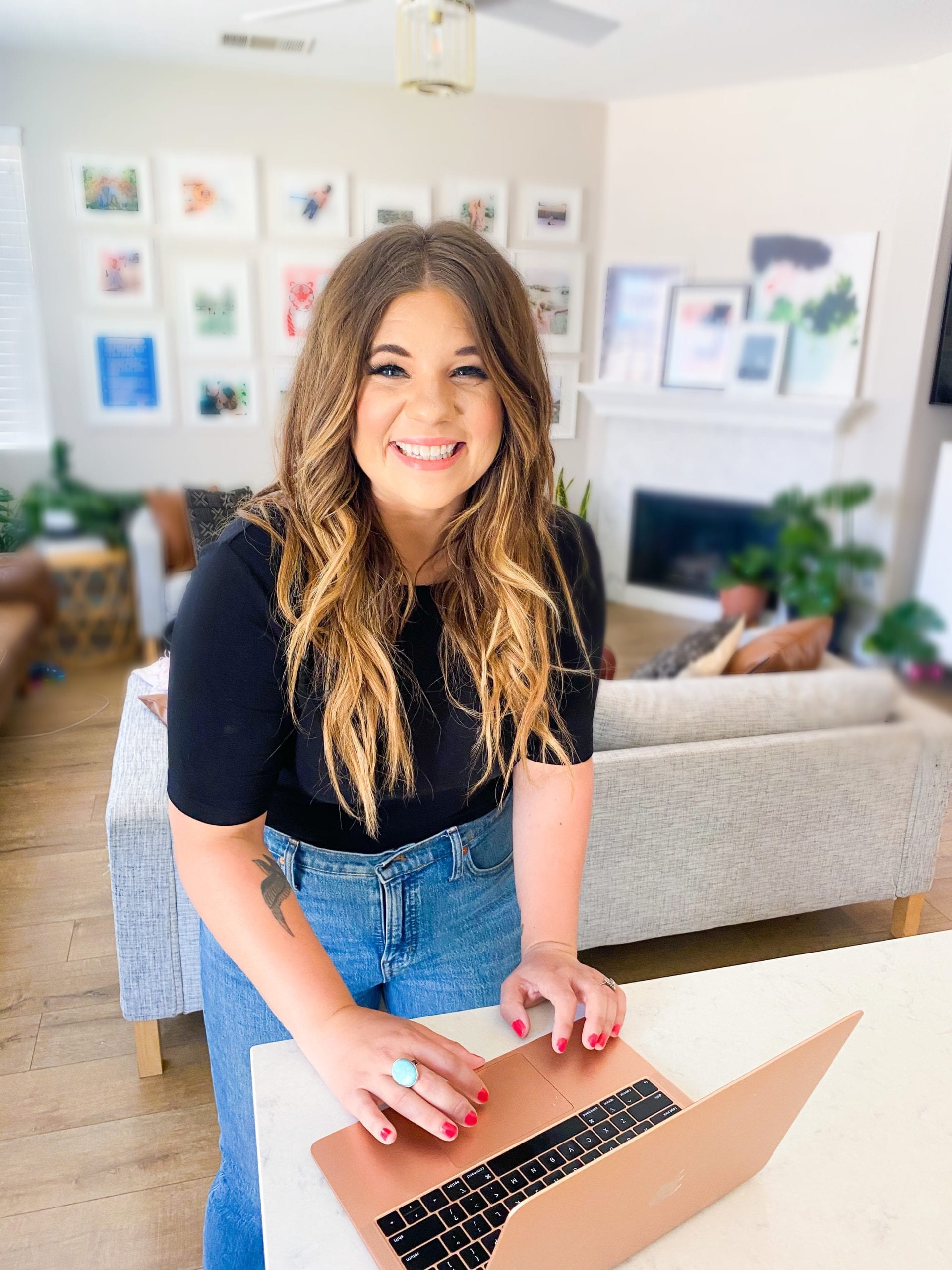

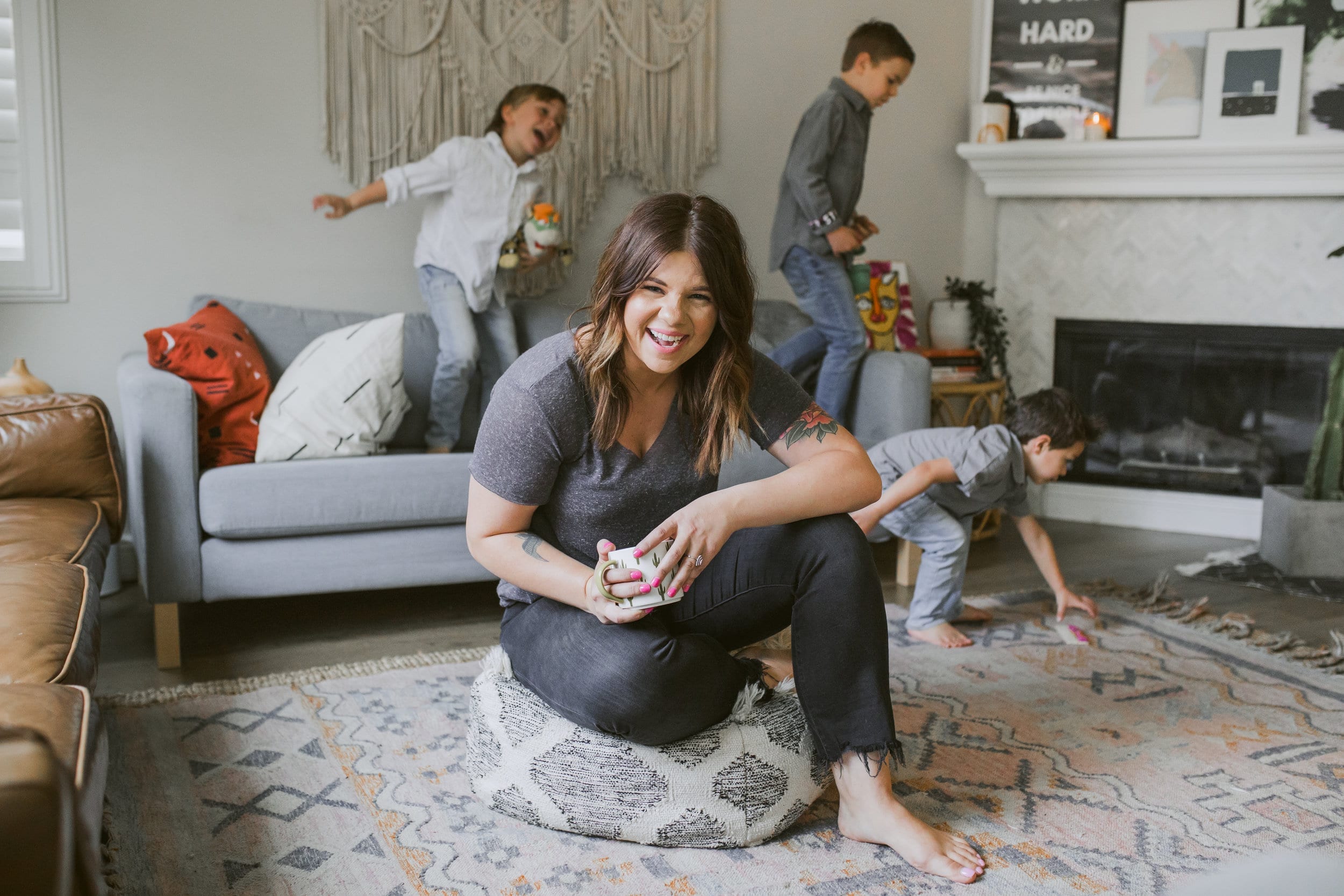

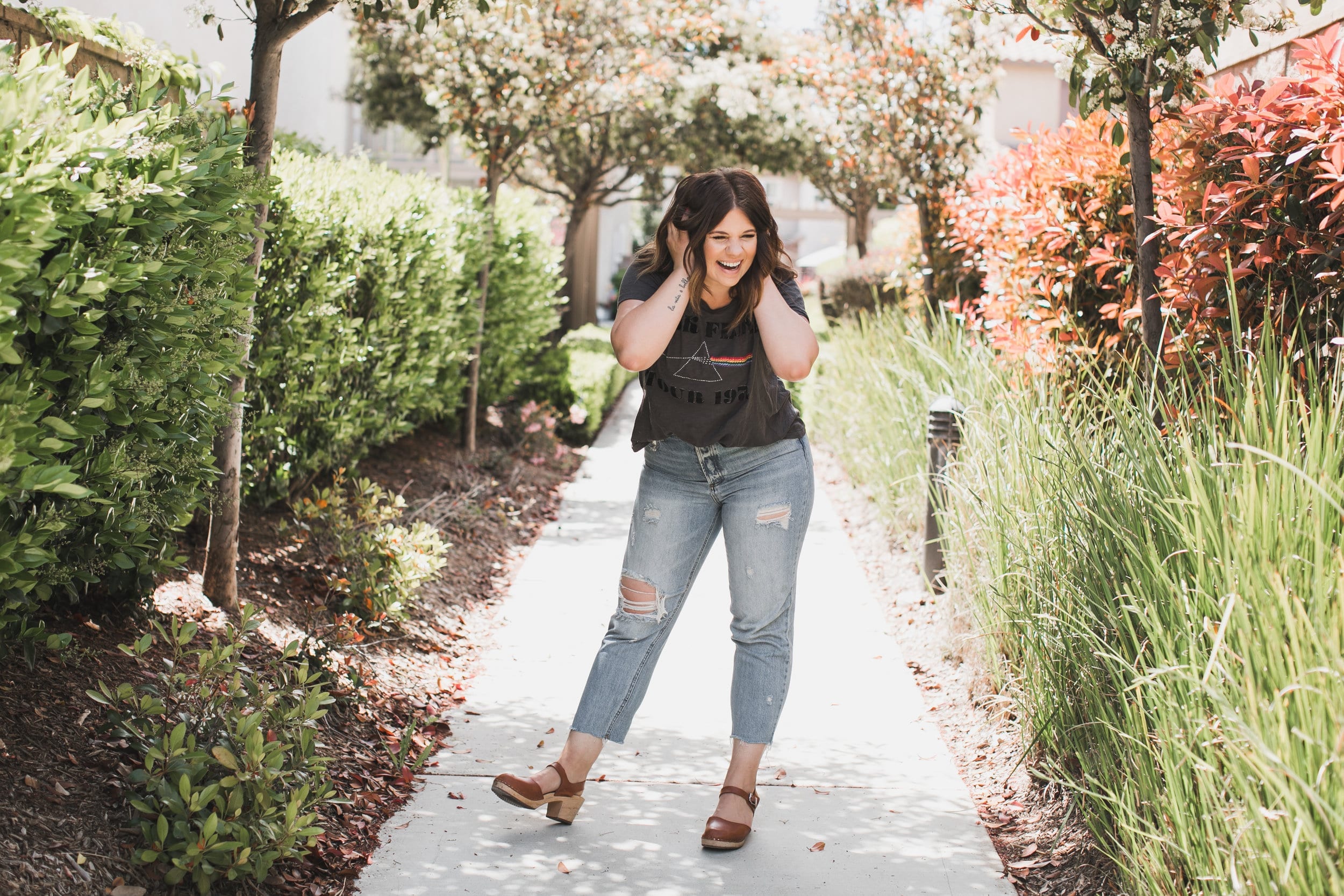

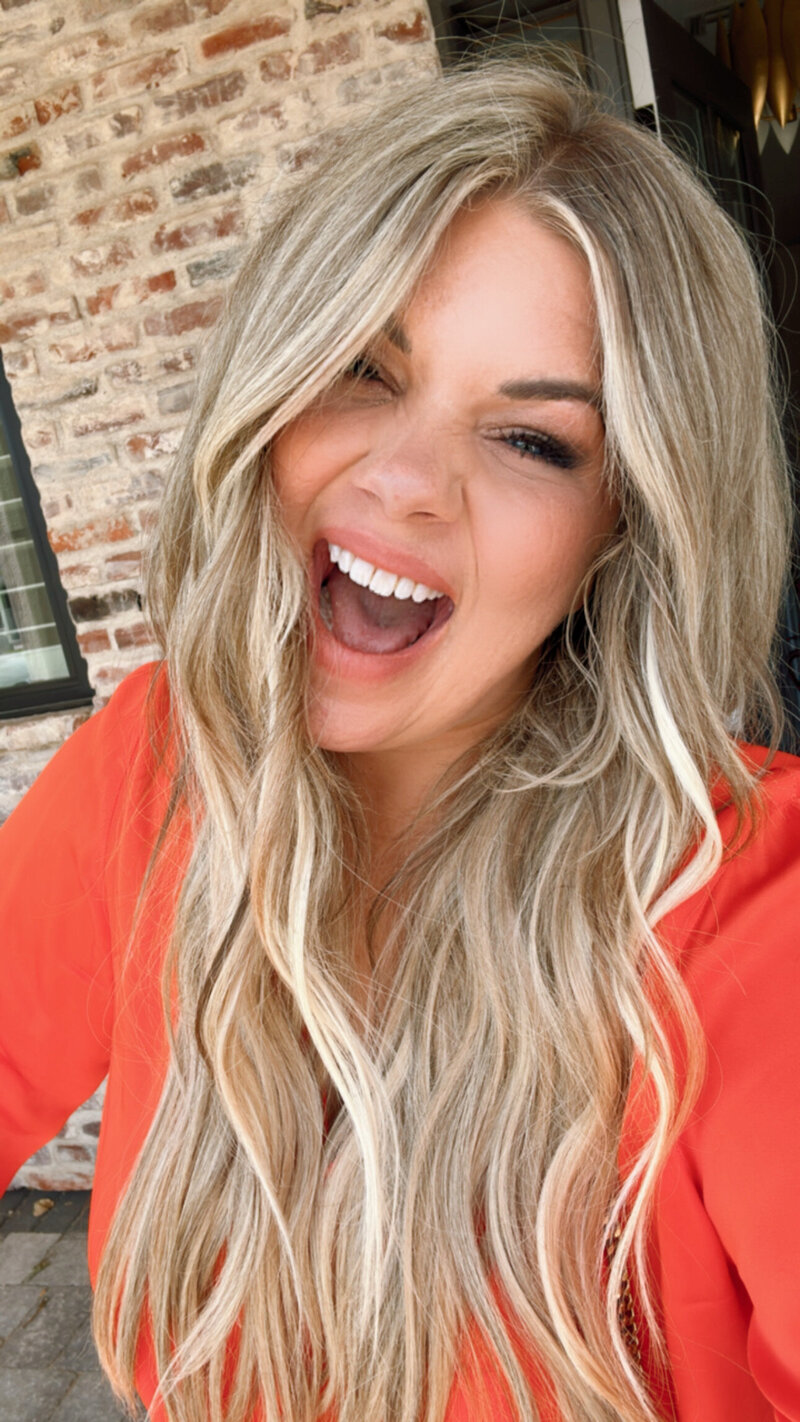



+ show Comments
- Hide Comments
add a comment